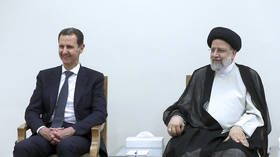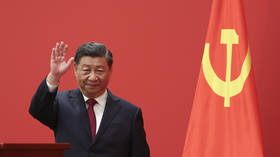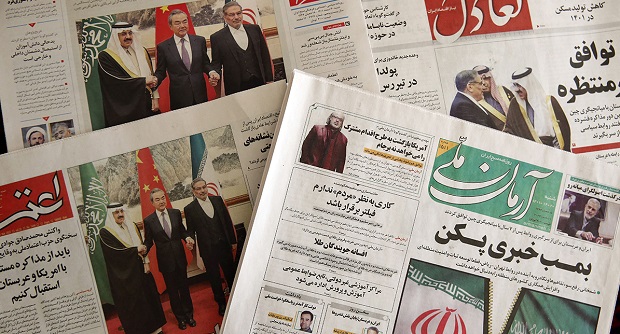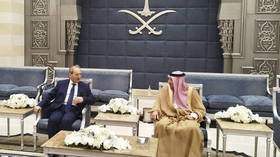KEY TURNING POINT IN DEEPLY-DIVIDED MUSLIM WORLD AS THEY SLAM THE DOOR ON WARMONGERING U.S. – START TO OPEN EMBASSIES & STRAIGHTEN OUT TIES AMONG THEMSELVES – IRAN’S PRESIDENT RAISI GOES TO SYRIA – AND TOGETHER WITH BASHAR ASSAD, THEY WILL ‘CELEBRATE VICTORY’ OVER DESPICABLE HEGEMON U.S. – AFTER PEACE DEAL ‘PERSONALLY BROKERED’ BY CHINA’S XI – ‘WEST ASIA HAS UNDERGONE A TENSE PERIOD OF GEOPOLITICAL CHANGE WITH TWO RESULTS: VICTORY OF IRAN AND FAILURE OF THE U.S.,’ SAYS TEHRAN OFFICIAL
Iranian president goes to Syria to ‘celebrate victory’ – officials
Ebrahim Raisi will become the first Iranian president to visit Syria in over a decade when he travels to Damascus this week for talks that Tehran’s ambassador to Damascus has touted as a “turning point” in regional relations.
The two-day trip to Damascus will foster closer ties between embattled nations that oppose Western world dominance, Ambassador Hossein Akbari said on Sunday in an interview with Iran’s state-run IRNA news agency, apparently alluding to America’s hegemonic foreign policy. “This trip will not only be beneficial for Tehran and Damascus, but it is a very good event that other countries in the region can also take advantage of.”

The timing of the visit makes it all the more important because of changes happening in the region, Akbari said. Iran and Saudi Arabia reportedly plan to open embassies in each other’s countries within days after agreeing last month to normalize relations under a deal brokered by China. Meanwhile, some Arab countries are normalizing relations with Damascus after years of joining the US in backing rebel fighters in a failed regime-change campaign against Syrian President Bashar al-Assad.
The Syrian uprising began in 2011, triggering a war that killed over 500,000 people and created a massive refugee crisis. Assad emerged victorious, regaining control of most of his country, thanks largely to military and economic support from Iran and Russia. Iranian officials hope that success will inspire other nations opposed to US hegemony.
“This trip can open a space and chapter of interaction between the countries that oppose the domination system, especially the countries that are in the area of sanctions and have common interests,” Akbari said. “Other countries can also use it.”
Mohammad Jamshidi, Tehran’s deputy presidential chief of staff for political affairs, said Raisi’s trip to Syria will be a “celebration” for the so-called “axis of resistance.” He added, “West Asia has undergone a tense period of geopolitical change with two results: victory of Iran and failure of the US.”
General Qasem Soleimani, the Iranian military commander who was assassinated by US forces in January 2020, taught his country’s leader that “successful diplomacy is rooted in being powerful in the field,” Jamshidi said.
The last Iranian president to visit Damascus was Mahmoud Ahmadinejad, who traveled to the Syrian capital in 2010. RT
Xi ‘personally intervened’ in Saudi-Iran talks – diplomat

Chinese President Xi Jinping played a key role in helping to persuade the leaders of Saudi Arabia and Iran to restore ties and end their seven-year diplomatic rift, a senior Beijing diplomat told the People’s Daily newspaper on Saturday.
Xi “personally persuaded the leaders of the two countries and supported Saudi and Iran to develop a friendly relationship as neighbors,” the director of the Chinese foreign ministry’s Department of West Asian and North African Affairs, Wang Di, told the government-linked newspaper.
Wang added that Beijing’s efforts to promote regional stability in the Middle East come amid “some large countries outside the region causing long-term instability” for what he described as their own “self-interest.” He also indicated that Beijing will be a “fair mediator” and that it will continue to be a “promoter of peace and stability in the Middle East.”
The talks between Tehran and Riyadh were notable in that the US was not involved, despite having been a key diplomatic player in the region for some 75 years.
Last month’s Beijing-brokered accord between Saudi Arabia and Iran was heralded as an important foreign-policy win for China. It also led to the kingdom launching peace talks designed to end the eight-year conflict in Yemen. It also signaled that Beijing’s “diplomatic credibility” in the region is gaining foothold with its economic influence, said Oliver John of Washington-based think tank Middle East Influence, according to Saturday’s South China Morning Post.
These tensions subsequently sparked several conflicts in the region and were among the contributing factors for the Syrian civil war – a conflict, Wang added, to which Beijing is keen to seek a diplomatic remedy.
Saudi Arabia cut diplomatic ties with Syria in February 2012, joining the US in backing the militants that sought to overthrow President Bashar Assad. With the backing of Russia and Iran, the government in Damascus eventually prevailed over the collection of rebel militias that included terrorists affiliated with Al-Qaeda and Islamic State (IS, formerly ISIS).
Beijing has also proposed a two-state solution to Israel and Palestine, Wang said, and Chinese Foreign Minister Qin Gang said this month that it could play an “active role” there in mediating peace talks.
The country’s efforts to promote stability in the Middle East also serve a dual purpose of anchoring existing energy deals, Oliver John added in SCMP’s report. Saudi Arabia is a key supplier of energy to Beijing, with China accounting for about one-quarter of its oil exports in 2021. RT
RT.COM
.

